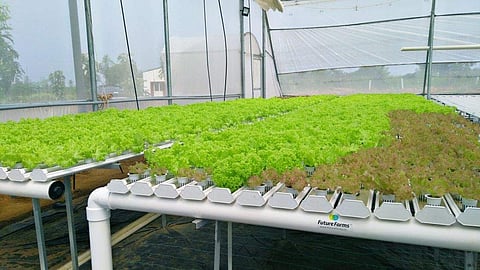

Walking into the nearest departmental store, you head straight to the organic foods section. All those colourful vegetables, pristine, dotted with soil, bringing in a colourful and natural vibe. But here’s the thing, not all organic food is sans pesticides, it just means it's non-synthetic pesticides.
However, there is a place that’ll give you clean, healthy, pesticide-free crop and have you be the farmer. All this idea needed was a father and son who were awaiting the birth of a child, a conversation about organic, healthy food and a video of a hydroponic farm. Mix those together and you've got yourself Future Farms, a one-of-a-kind place where aqua nurtures and shapes a clean nutritious diet for your plate.
The brainchild of Sriram Gopal, who wanted to give to the people of this diverse agrarian economy a clean food system, Future Farms is India's largest Hydroponic brand whose aim has been, from inception, to bring in a clean food network that sadly does not exist in the country today. It is manufactured to suit the needs of the Indian people, both in terms of crop and variety, and comes pesticide-free.
“Our goal from day one has been to start a clean food network. If I challenge someone to go to a departmental store and pick out food without pesticides, they’d find it very difficult. Even if it is called organic, people think it means clean but it just means non-synthetic pesticides,” says Navin Dorai, Chief Marketing Officer.
Teeming with fresh, well-nourished vegetables, Future Farms aims to bring in an alternative, viable and environmentally sustainable option to the Indian food sector and make hydroponic farming the future for a clean food system. “Most of our work is done keeping in mind the word ‘future’. In the end, if it doesn’t get you clean food, we won’t do it,” adds Navin.
Advanced aromas, structures and even quality, plant food and RO water are used to provide the plants with all the necessary nutrition required. Another rule the farmers here stick to is a “hands-free” approach to your meal. In simple terms, Navin explains, they believe that from the time the produce has been picked till it reaches your plate, it shall not be touched by human hands, and adds that they wear gloves.
In a country renowned for its agrarian contribution and produce, Future Farms already has an army of eager farmers of varying ages, a majority of whom have no background in agriculture or hydroponics. Yet it is the vision of consuming and producing pesticide-free food coupled with a transparent clean system that drives them forward towards a sustainable future.
In order to promote a transparent system, visitors are allowed to visit the farms and gain a hands-on experience. That education is the only way to overcome skepticism, a trait India is famous for, and to convince people to adopt a new method of farming is their core belief. As the world changes its outlook to the food sector as a whole, several big companies are venturing into the sustainable food sector, spending billions in investments.
Having sold farms to companies like Adani and Dabur, Navin says that while the business boom has been recent, he’d like to believe that it's the result of the work done by them in the last four years that has borne fruit now.
“We named it Future farms because we want people to know that the future of farming needs to be clean, green and sensitive. Hydroponics is one good means of achieving that goal. Since a majority of the country is still agrarian in means, the government should have a method to evaluate a difference between the systems,” says Sriram, who adds that while India does not lack in technology, it is the government’s resistance to try something new that is the deterrent.
The farm also goes child-friendly with its awareness and has a variety of colourful, flavoured kits for children that come with its own manuals and requires hardly any adult supervision. Its belief that the grassroots are as much a contributor to this idea also sees school students come on field visits, often with wonderment in their eyes, understanding the need for its importance.
While the kits and products range anywhere between Rs 1,000 and Rs 45,000, the farm has special kits for kids costing between Rs 1,000 to Rs 2,000 and even has informative and simple YouTube videos.
“We knew the venture would be expensive, but this is something that is necessary in order to adopt a clean food network,” justifies Navin. While the cost incurred to set up a farm is high, they provide the required assistance to their clients and contribute to the setting up of the farm. With farms now in metro cities including Delhi, Hyderabad, Mumbai, Gujarat, Chennai and Bengaluru, they are also beginning one soon in Agra and Kathmandu.
As we wrap up, their promise for a green and clean future fades, replaced by the sound of flowing water, waking thousands of plants for their mission to contribute to a clean future for humans.
